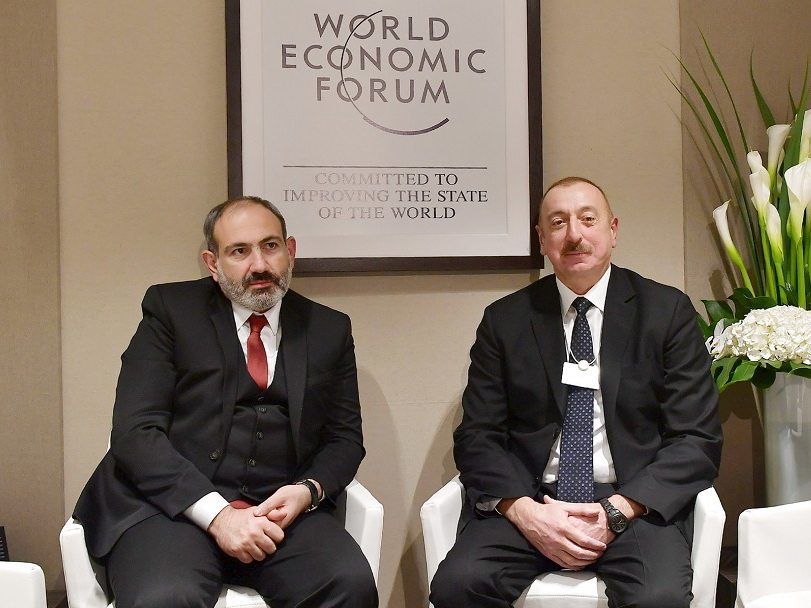Nagorno-Karabakh conflict reaches dangerous stage

A risky combination of official Armenian rhetoric and the exhaustion of Azerbaijani patience raises concern that another full-scale war could break out in the South Caucasus.
On September 28th, Azerbaijani Foreign Minister Elmar Mammadyarov, addressing the general debate of the 74th session of the UN General Assembly, pointed out that the settlement of the Armenia–Azerbaijan Nagorno-Karabakh conflict marked no progress over the last twelve months, since the last year’s General Debate.
He further added that “the negotiations cannot last forever” if the sides continuously fail to reach a breakthrough.
This statement reflects a view that is widely shared by the members of the Azerbaijani political and expert community about the existing status-quo in the three-decades-old conflict. The negotiations for its settlement mediated by the Minsk Group of the OSCE since the mid-1990s have started to be commonly considered pointless by the Azerbaijani public who push the government to achieve an immediate resolution at any rate, including an all-out war.
This generates a threat for the breakout of a sudden military clash in the South Caucasus where the present stability is often taken for granted by the international community.
This is the first time since the governmental change in Armenia last year that the Azerbaijani side seems to have lost all hope for a breakthrough in bilateral negotiations. As a matter of fact, the immediate aftermath of the overthrow of Serzh Sargsyan’s government in Armenia marked a newly found commitment in the conflicting sides to look for ways to bring about progress in the resolution process.
A certain degree of optimism was also caused by the short meeting between the leaders of the countries, President Ilham Aliyev and Prime Minister Nikol Pashinyan, on the sidelines of the Commonwealth of Independent States (CIS) summit in Tajikistan’s capital, a year ago on September 28th. In the course of the meeting, which was the first between the two, they vowed to de-escalate tensions and create a direct hotline between the two sides.
The subsequent summit of the two leaders, in Vienna on March 29th of this year, looked also positive as both sides described it “constructive”. In the months afterwards, the foreign ministers of both countries met on several occasions to facilitate this process and, towards this end, they also vowed to prepare their public for peace. These developments were really perceived by many observers as a sign of commitment from the new Armenian government to reach an agreement with Azerbaijan.
This promising situation in the region, nonetheless, failed to produce tangible results and dramatically eroded in recent months. The bellicose statements of the Armenian leaders and abrupt changes in the official rhetoric of Pashinyan’s government nipped all hope for a breakthrough in the bud.
This in fact started to show itself even before the first summit of the leaders of two countries. For example, on March 1st, just days before the Vienna summit, Armenia’s former National Security Director Arthur Vanetsian defiantly declared that “[N]o one will surrender even an inch of land”.
By aggravating the situation further, Pashinyan even attempted to change the negotiation format endorsed by the OSCE and sought to bring in the representatives of the so-called “Nagorno-Karabakh Republic” – a regime established by Armenia in the occupied territories of Azerbaijan. Although his move was objected by the Minsk Group and eventually sidelined, it demonstrated the true nature of Armenia’s approach to the resolution process.
The situation recorded a new low in early August, when Pashinyan called for the unification of Armenia with Karabakh. In his address at the opening ceremony of the Pan-Armenian games that were held illegally in Khankandi, part of the Armenia-occupied internationally recognised territories of Azerbaijan, Pashinyan provocatively declared that “Arstakh is Armenia” (Arstakh is the Armenian name for Karabakh).
Calling for the unification between Armenia and Karabakh, he even broke the tradition of former Armenian governments that used to deny Yerevan’s control over the “Nagorno-Karabakh Republic” and as such made a direct provocation to the Azerbaijani side.
Farid Shafiyev, Chairman at the Baku-based Center of Analysis of International Relations, names the present period in the conflict resolution process as “post-negotiations”. Commenting on the latest meeting between the foreign ministers of Armenia and Azerbaijan on September 24th in New York, he stated that “The meeting … was formal. Obviously, we have entered the ‘post-negotiation’ period, the onset of which should [have been] expected in the light of the radical and populist statements of the Prime Minister of Armenia Nikol Pashinyan, sounded over the past few months.”
Last time when Azerbaijani officials expressed such pessimistic statements about the prospects of the negotiations, tensions in the region escalated abruptly and the two sides eventually found themselves in a war in April 2016 in the bloodiest confrontation since 1994. With massive investments into military resources, the Azerbaijani side looks determined to change the status-quo and liberate its occupied territories by force.
Having boosted its defence budget by around five per cent in 2019 and testing new weapons and military tactics despite low prices on the oil market, which is the primary source of revenue of the country, Baku is preparing hard towards this end.
This generates a critical situation that would turn out catastrophic not only for the conflicting sides but also for the wider region. Numerous risky regional developments, primarily the apparent failure of the negotiations, the rise of far-right populism in the region as exemplified by Armenian government’s provocative statements, and the exhaustion of the patience of Azerbaijani public for a peaceful settlement, demonstrate that the embers of the conflict are smouldering again and raising concerns for another full-scale war.
The international community, in particular the European Union and United Nations, should, therefore, act proactively, push the sides into substantive negotiations and thus prevent the emergence of another bloody conflict in the already war-torn region.
Dr. Vasif Huseynov is a research fellow affiliated with the Baku-based Center for Analysis of International Relations.














